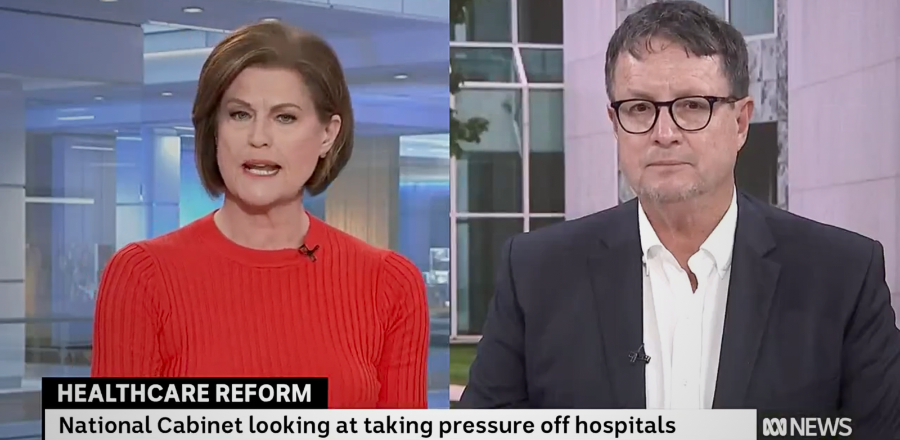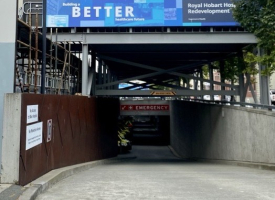AMA President Professor Steve Robson on ABC News at Noon
Transcript: AMA President, Professor Stephen Robson, Outlet: ABC News at Noon, Friday, 28 April 2023
Subject: Public Hospitals Report Card, National Cabinet, health funding reform

ROS CHILDS: Health reform has been on the agenda of the National Cabinet this morning, with state and territory leaders looking at how to take pressure off hospitals. And it comes as a new report from the Australian Medical Association has found the public hospital system is in the worst shape it's been for more than a decade and a half. Here's Dr Steve Robson, who's president of the AMA. Steve, thanks so much for being with us this afternoon. Good to see you. So let's start with the National Cabinet then. What do you think of what came out of that meeting?
STEVE ROBSON: Yeah, Good afternoon, Ros. It was really gratifying to see the National Cabinet put health as one of their highest priorities. We know that premiers and chief ministers have been extremely concerned about what we found in our report today, that performance in public hospitals is at an all-time low. They recognise that only a unified approach between state, territory and the federal government is going to deliver results for Australians, and we think that's a very encouraging sign.
ROS CHILDS: We'll get to the report in more detail in just a moment. But how will the changes announced half an hour ago help to take the pressure off the public hospital system and achieve better outcomes for patients?
STEVE ROBSON: Yeah, I think it's become obvious for quite a while now that one of the key things that we can do to relieve pressure on our public hospitals is keep people out of public hospitals in the first place. And to do that, it's going to mean access to good, high quality general practice. We've seen that absolutely endorsed by the National Cabinet today, and they're looking at measures that will improve staffing and building teams in general practice, allowing access to general practice out of hours that will hopefully have a relieving effect on people having to go to emergency departments. Just recognising that it's no longer a siloed thing where states and territories manage public hospitals and the Commonwealth government manages general practice and primary care. That everybody has to work together if we're going to find solutions that will make health more accessible for all Australians.
ROS CHILDS: Were you hoping to hear more though, Steve? Was every one of your boxes ticked?
STEVE ROBSON: Look, we know that there's a lot to do. We know there's an enormous need for system reform around the country. It was just great to see an acknowledgement that the only way forward is going to be with all levels of government working together. And we need to make health accessible and affordable for Australians. Particularly the most vulnerable Australians, the people who really go to public hospitals a lot and need that care. So making sure we do everything we can to support them through the health system is really a great sign and it's a really positive message today.
ROS CHILDS: So let's look at the AMA's report on the hospital system in detail now, which you say is in its worst shape for a decade and a half. So which are the elements that need attention most urgently?
STEVE ROBSON: Yeah, I don't think I'll be saying anything Australians don't see all the time in their own families and groups. We know that it's extremely difficult to have planned surgery in our public hospitals, that there are long waits to see a hospital based specialist if you need care and assessment, and that for Australians who need to seek care in emergency departments, there are long waits and battles. The thing we know is that the nurses, the doctors, everybody involved in health care in our public hospitals is desperate to provide more care and to work. And we think now is absolutely the time to look at resourcing and funding to allow these health care workers to do their job to the top of its scope.
ROS CHILDS: There's also been a call for a new funding model. How would that help to ease the problems the hospital system is facing?
STEVE ROBSON: Yeah, we know that across the pandemic the funding model was changed so that there's 50/50 funding from Commonwealth and states to public hospitals. We know that the premiers want that to continue. We're hoping to see signs this will go, the hospital funding reform agreement is at its halfway point, and there's a review going on at the moment. And we're really hoping that the signals we're seeing from the premiers today will be translated into action, and we'll have a new health agreement. The next one that comes into place in a couple of years will take into account the need for resourcing and funding and also to incentivise great outcomes for Australians. We think this could be a real turning point if the Government handles it well.
ROS CHILDS: So just to finish, how will the announcement from National Cabinet today work to bring down waiting time for surgery, to bring down emergency wait time, and also to increase the numbers of hospital beds?
STEVE ROBSON: Yeah. So a lot of what was discussed at the National Cabinet today is around reform in general practice, but we think that's critically important because we know that people with multiple chronic health conditions are much more likely to go through emergency departments, much more likely to need hospital care. So all of the announcements we hear today will make it easier for those patients to get either care to keep them out of hospital, or care that allows them to leave hospitals earlier than they otherwise would because care's available in the community. That's all great stuff. And we really encourage a further reform along these lines, it's a great sign.
ROS CHILDS: Steve Robson, thank you so much.
STEVE ROBSON: It's a pleasure, Ros.


